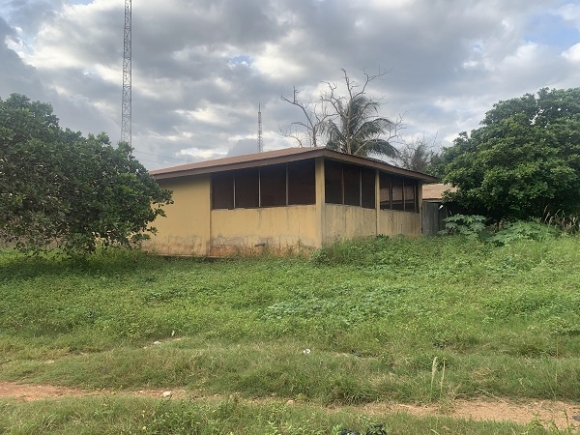Tuobodom, a town located in the bono East Region, is home to a group of “wealthy young men” whose prosperity comes from tomato farming.The growing interest in agriculture among the youth is viewed as a positive transformation in the community.This is evident in the improvement in lifestyle, construction of buildings, development of farm infrastructure and other projects led by these successful farmers.
These young men, aged between 18 and 26, are engaged in the cultivation of tomatoes, cabbages and green pepper on a large-scale.
Education
However, concerns about the future of education in the area have been raised by some residents.
According to these residents, many of the young farmers discontinue their education after completing Senior High School (SHS) due to the financial gains they make from tomato farming.Visit
Parents interviewed by The Mirror expressed dissatisfaction with their children’s unwillingness to pursue higher education.
According to them, they also desired to have educated individuals (“akrakyifo ne ewurabafo”) in their households.A mother of four, who gave her name as Adwoa Bee, said one major challenge of parenting was having children who do not want to pursue higher education, largely because of their involvement in tomato or cabbage farming.
Former assembly member
Drawing from his own experience as a parent and a former assembly member of the town for 18 years, Uncle Agoloso stated the need for parental control.
“I had to use force before my children left this town to go and pursue other professions. If you are a parent here, you have to apply force.” Tomato is one of the main crops the farmers grow
The money
He said that a box of tomatoes could fetch GH¢2,200 and some of these young farmers could harvest up to 80 boxes.
“What this means is that, if a high school student had a classmate who completed junior high school but stayed home to farm tomatoes, within a year, the latter could make GH¢50,000,” he stated.
According to him, the tomato farming season usually spanned just three to four months, making it a lucrative option.
“As a result, many students are tempted to abandon their education and venture into tomato farming.”Some of the youth of the town are always ready for “by day” jobs on the farms
Aside education, the former assembly member admitted that Tuobodom was one of the rapidly developing communities in the region, emphasising that the young men were indeed very affluent (“mmerante3 nu wo sika papa”).
Another parent, known as Homeburger, noted that young men who combined cashew farming with tomato cultivation were making huge sums of money.
He said that a bag of cashew nuts could sell for GH¢800 and when combined with tomato, it yielded significant profits. Tricycles are very common mode of transport for the farmers
Homeburger however observed that “ because there is a lot of money in the system, the youth go into early marriages and childbirth”.
Recommendation
The Okyeame of the Tuobodom Omanhene, Adu Gyama, commended the young men and recognised their contribution to vehicles coming from far to patronise tomatoes.
He said that on any given day during the season, over 100 cars arrived from various locations such as Takoradi, Cape Coast and Accra to purchase tomatoes in bulk .
He then took this reporter to a selected site for a tomato factory, stressing the importance of the government establishing such a facility for the town's residents.
Omanhene’s palace
The Omanhene, Nana Agyei Kokoo Takyi Firi Bayeeman I, explained that “Tuobodom” was derived from “Tuo,” meaning gun and “bodom,” signifying dog.
According to him, Tuobodom served as the capital of the Techiman North District, with its inhabitants primarily engaged in farming, trading or government employment.
He said the farmers were involved in farming various crops such as cashew, cabbage, yam, tomato, cocoa and green pepper adding that both the young and older farmers continued to rely on traditional farming methods instead of embracing more modern and commercialised approaches.

A site earmarked for a tomato factory
The omanhene proposed the use of greenhouses for tomato cultivation to reduce dependence on tomato imports from Burkina Faso.
‘Parliament’
Within Tuobodom, there were designated gathering areas known as “parliament” where young people convened to discuss various social issues.
Some of the young men expressed the view that some of their teachers were heavily involved in farming, which influenced their preference for practical agriculture over formal education.
A 24-year-old named Yaw sought advice from this reporter on whether he should continue his education or return to farming.
He disclosed that he earned GH¢30,000 from tomato farming the previous year and had enrolled in the Offinso College of Education, however, “anytime l come back home, l feel like l made a mistake going back to school.”
Farmhands
The farming activities at Tuobodom attracts labourers from nearby towns such as Techiman, Tanoboase and Nkoranza, who work as farmhands for a daily wage of GH¢50.
A youth leader, Wayo, stated that one farmer could employ up to 40 labourers .
The majority of the youth interviewed by The Mirror called on the government to regulate tomato and cashew prices and provide support for other forms of farming.
They expressed frustration that their town was often portrayed negatively in the news despite the many positive developments happening at Tuobodom.




No comments yet
Be the first to share your thoughts!